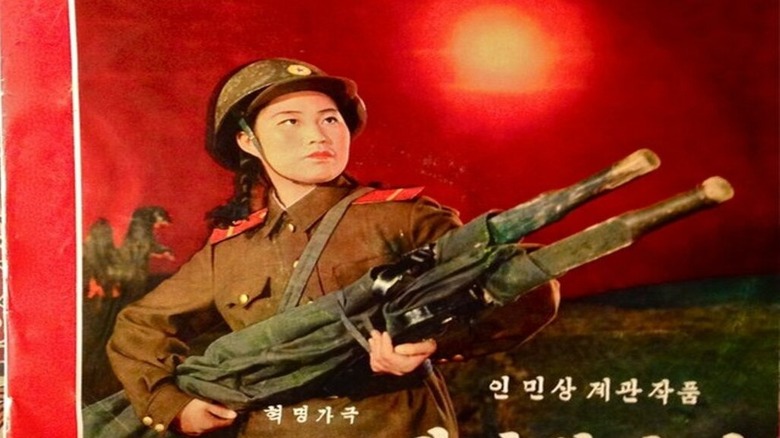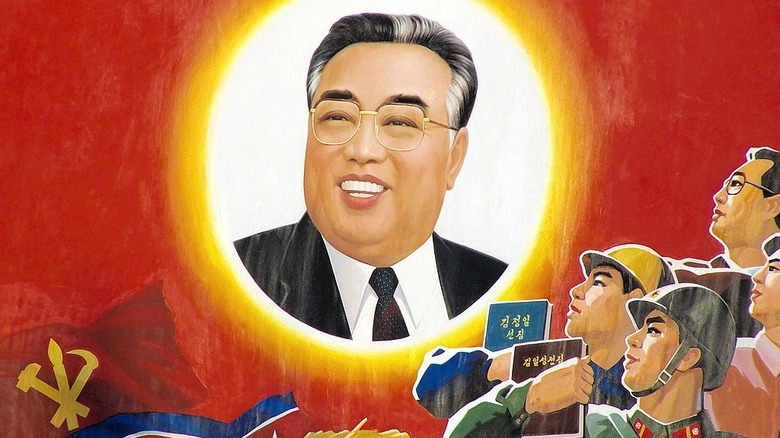The Song North Koreans In Pyongyang Hear Every Morning
As we all know, morning rituals are important and vital to center us for the day that awaits. Now, let's imagine for a second you're waking up in Pyongyang, the capital of North Korea (or The Democratic People's Republic of Korea, as it's more formally known). It's 6 a.m., but instead of a rooster crowing, or an alarm clock blaring, an eerie, warbly melody drifts into from your window and shakes you from your slumber.
As you awake, you recognize it. Naturally, it's the same melody you've been hearing every single morning. Cascading synth lines swirl through old, cracked speakers in ghostly, impressionist passages that also contain a victorious chorus and a mournful solo soprano yearning for the presence of the benevolent Great Leader, Kim Il-Sung.
If you're one of Pyongyang's reported 2.5 million citizens, this tune is the first thing you hear every morning. Like clockwork, it reportedly emanates at 6 a.m. from Pyongyang's central station every day and is heard far and wide (per NK News). Although we don't know for sure how long this curious morning ritual in Pyongyang has been occurring, tourists in North Korea have been capturing it since 2008 (via VICE). The tune itself is taken from the epic ”Where Are You, Dear General?”, from the North Korean opera, ”A True Daughter of the Party”.
Fascinatingly, the origins and composition of this tune offer a fascinating insight into how the Kim Dynasty harnessed the power of opera to embody the ideals of their ideological state apparatus and remind the audience who holds the reins of power.
Origins of the Song
North Korean Opera came into its own after the Korean Revolution, and during the Cold War when many states fought for the supremacy of their ideologies. In his book ”On the Art of Opera," the Former Supreme Leader, Kim Jong-Il wrote, ”Only opera art which resolutely champions the interests of the revolution and implements Party lines can be loved by the people and become a powerful weapon for encouraging them in the revolution and construction.”
As you can see, the Kim family used opera to cement their cult of personality and advance their authoritarian dogma. ”A True Daughter of the Party," premiered in 1971, tells the tale of a nurse, Kang Yonok, who tends to injured soldiers in a field hospital in the Taebaek mountain range ("Songs for ”Great Leaders" by Keith Howard).
''Where Are You, Dear General?” is the opera's epic climax and features an all-male choir, each of whom is decked out like four-star generals, which contrasts with Kang's sorrowful soprano, which laments her longing to meet the ”Dear General” Kim Il-Sung. Lyrically, the song invokes cosmic and pastoral pictures of the unparalleled beauty of North Korea's countryside.
Moreover, this opera was reportedly composed by the Former Great Leader himself. Although much like Henry VIII, who reportedly composed ”Greensleeves” this claim should be taken with a pinch of salt. After all, both men were notoriously decadent and had no qualms about making their adversaries vanish. Furthermore, Kim Jong-Il also claimed to write 1,500 books and six operas, all of which are ”better than any in the history of music," per WQXR.
Who's Your Daddy?
The Kim Dynasty isn't paying tribute to the triumphant peasants and laborers depicted in the opera every morning. The message is considerably more sinister. After all, with many North Koreans living in abject poverty, it's unlikely that they'll be visiting the opera box anytime soon (via Borgen Project).
Understandably, Kim Jong-Il's desire for people to know he composed these operas is noteworthy. After all, he, his father, and his son have committed their lives to maintaining their mystique as divine beings amongst their subjects. Although sources claim that Kim Jong-Il was a talented violinist and pianist ("North Korea: State of Paranoia" by Paul French), the true reason why this opera piece is blasted over Pyongyang every day has little to do with flashing his musical chops.
Instead, Kim's interest in Korean revolutionary opera stems from its ability to serve as a jingle for the family propaganda machine. After all, it was written while Kim Jong-Il was aspiring to succeed his father. Furthermore, Kim also declared that "culture was key to maintaining the regime and keeping people's loyalty" (per WQXR).
As a result of daily airings of "Where Are You, Dear General?" the cult of personality ideal of the "ultimate positive hero" becomes implanted in the waking life of every citizen. It also positions his own father, Kim Il-Sung, as the father of every North Korean (”Songs for Great Leaders”).
At the end of the day, North Korea has eradicated any music that's not state-sanctioned from its culture. This peculiar and pervasive wake-up call is but another tragic facet of the regime's stranglehold on the thoughts and feelings of its people.


